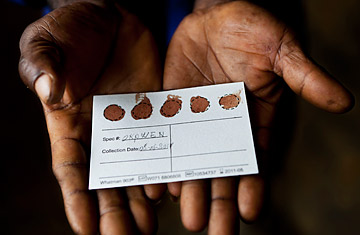
Hunters collect blood from animals they've killed and turn it in for research.
(5 of 6)
At a hamlet in southern Cameroon, Joseph Diffo, a local GVF staffer, gathers villagers for his healthy-hunters talk. Using graphic pictures of sick and dead animals, Diffo explains the danger of infection that the blood of a primate might pose to a hunter and his family. "You can't always tell the difference between a sick animal and a healthy one," Diffo tells his audience in French. "Even if you think hunting is safe, there's a problem of viruses out there." He urges them to be mindful of cuts and scrapes on their hands as they butcher prey and to wrap the carcass in plastic or leaves if possible--all to prevent blood-to-blood virus transmission.
Central Africans already know plenty about the risk of disease. Ebola, which is transmitted by sick primates, is a real threat, not just the stuff of Hollywood outbreak thrillers. But safety doesn't always win out over hunger, and most hunters seem more concerned about stampeding elephants than novel viruses. After Diffo's talk, we walk to a nearby hut to watch a woman and her son butcher a recently killed porcupine. First they skin the animal; then they boil the carcass to strip off the quills. With the animal's flesh pink and raw, the woman tears into its belly with a machete and pulls out the yellow, glistening internal organs. Blood begins to flow as she chops the quivering carcass into quarters, kneading the meat with her hands. This is an encounter with the blood and attendant microbes of another species that, as Brilliant puts it, is "more intimate than sex." Multiply that interaction--each of which could seed a devastating new infection--a thousandfold every day throughout Central Africa and other viral hot spots, and you can see why Wolfe is worried. "It's as if there is a lottery going on and the odds are getting better and better for the microbe," he says. "And the stakes are getting higher and higher all the time."
The New Age of Epidemiology
While our growing global connectedness makes us more vulnerable to new diseases, it also gives us powerful weapons. With the Internet and mobile phones, epidemiologists can quickly track new outbreaks as they happen--even in the most remote corners of the world. Groups like GVF and the New York City--based EcoHealth Alliance have set up lasting partnerships on the ground with local governments, building scientific and organizational capacities to respond to new viral threats. Even the Department of Defense is playing a vital role, thanks to a network of high-tech microbiology labs in vulnerable countries like Egypt, Kenya and Indonesia. (The armed forces have been deeply involved in infectious-disease research for decades, in part to ensure the health of troops deployed overseas.)
"We can maintain active surveillance on new pathogens in these countries," says Captain Kevin Russell, director of the military's Global Emerging Infections Surveillance and Response System. "Maybe preventing a pandemic is beyond our means now, but we can get ahead of the curve."
